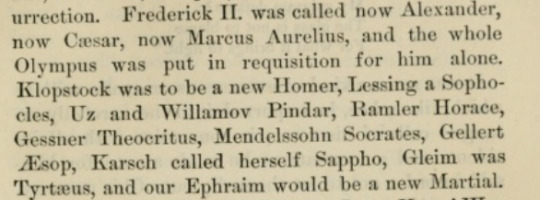#ephraim moses kuh
Text
my friends & I projecting onto people who died centuries ago

#not in an exploitative or militaristic way I hope#just longing for shared humanity#frederick ii#friedrich ii#friedrich gottlob klopstock#gotthold ephraim lessing#johan peter uz#johann gottlieb willamov#karl wilhelm ramler#salomon gessner#moses mendelssohn#christian fürchtegott gellert#anna louisa karsch#johann ludwig wilhelm gleim#ephraim moses kuh#klopstock#lessing#uz#willamov#ramler#gessner#mendelssohn#gellert#karsch#gleim#kuh#oof that's a lot#berthold auerbach#dichter und kaufmann#auerbücher
9 notes
·
View notes
Text
Friends and mutuals thank you for enduring my auerblogging thus far. It is not in vain because Auerbach is putting such words into Lessing's letters:


I don't know how to tag this so that more people see it but one of the things that particularly draws me to the study of the Lessing/Mendelssohn/Nicolai/Karsch/Wincklemann etc. writings is that nobody is independently wealthy; they inhabit a mercantilist /early capitalist paradigm which considers them for their ability to serve the state rather than their inherent value as human beings or the truth they themselves love, and that forces the first to supply the latter two.
The Sturm-und-Draenger contemporary to them and the Romantics after them may have sought liberty in the depths of human emotion, but it occurred to them, as it occurs to Auerbach's Ephraim Kuh on pg. 180 that they will never be loved by the institutions they will devote so much of their lives, and yet they love. And yet they think, and commit themselves in ink to an uncertain posterity, and centuries afterwards we read their words and recognize this hope was not in vain. There is a mind on the other end of the line worth knowing, and if we are lucky there is a mind centuries after us who will not remember us for our jobs but for our professions
#is this how my classics friends feel when#someone will remember us#I say#even in another time#?#only the questions of relevancy to the state and the economy are much more apparent working with 18th century sources#nevertheless#we catch our breath at the places where the breath was always caught#berthold auerbach#ephraim moses kuh#gotthold ephraim lessing#moses mendelssohn#anna louisa karsch#friedrich nicolai#auerbach#kuh#lessing#mendelssohn#nicolai#karsch#die karschin#dichter und kaufmann#auerbücher
8 notes
·
View notes
Text
My dear friends and mutuals I read the first chapter of Berthold Auerbach's book Poet and Merchant: a Picture of Life from the Times of Moses Mendelssohn and I am afraid that I am going to have to blog the whole book.
Originally published in 1839 as Dichter und Kaufman: ein Lebengemälde aus der Zeit Moses Mendelssohns, the book is available in English translation at HATHI Trust and in German on Google Books in its first and second volumes. I'll be reading the English edition, partly for ease of website access & partly because of lines like these:

Knobloch mentions the book in Herr Moses in Berlin, almost a century and a half later, in conjunction with the titular character Ephraim Moses Kuh. The book promises to be a fictionalised account of Kuh's life as he relocates from Breslau to the big city "in the time of Moses Mendelssohn & a portrayal of (Auerbach's conception of) Jewish life in German-speaking places during this period. It's one of several historical novels by Auerbach, who was a big fan of Spinoza and had previously made him the subject of a biography.
But while in life Auerbach seems to have been quite vocally opposed to Antisemitism—he came from a poor Jewish family himself before being seduced by Spinoza—the first chapter has not been promising in its attempts to portray the "local color" which characterizes the genre.
I'll be tagging posts about Dichter und Kaufmann as #Auerbücher. I anticipate that the book will potray (at least) some in-story Antisemitism & Weird attitudes towards women, and while I'd like to be surprised to the contrary I expect these are things that not everyone wants on their dashes. My fervent wish is that this experiment records a 19th-century authors Historical RPF & maybe provides some material for my eventual undergraduate thesis.
In the meantime, I'm gonna be real Not Normal about reaching back into the past and trying to hold hands. Please ignore and/or forgive me as you see fit.
–Sherb
5 notes
·
View notes
Text
I'm a Little Disappointed in Auerbach's Translator
So I'm reading Auerbach's Poet and Merchant in English translation because I like the formatting of that edition better, but on page 50 Ephraim's dad said something that confused me at first:

He goes on to say that the "Liberals" encourage Jews to turn away from their faith & assimilate to the customs of the majority society. That's a pretty consistent complaint across the centuries, so when I heard the word "Liberals" I worried Moses Daniel might have been referring to debates & reforms which would take place in Hamburg half a century after the setting of Dichter und Kaufmann, which would lead to the founding of Reform "liberal" Judaism.
Obviously that's anachronistic to the time of Mendelssohn and Kuh, but not to Auerbach's time, and there's some ideological similarities between the philosophers of the 18th century and the reformists of the 19th, so I went back to the German copy of Dichter und Kaufmann and found the same speech:

Auerbach's original refers to the "Aufgeklärten," that is, participants in the Enlightenment, many but not all of whom would have identified as "liberals" in the political or economic senses of the word. Maybe since the German word Liberal is associated with Reform Judaism, the translator of Dichter und Kaufmann wanted to indicate a continuity? I probably would have just said "the philosophers" or even "the philosophes," while the word "maskilim" might indicate that Ephraim's dad is raising an intracommunal concern but depending on the circumstances could be anachronistic.
In conclusion, translation is interesting and Sherb is dumb
5 notes
·
View notes